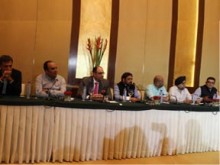
Travel and hospitality associations came together to analyse the impact of the Supreme Court’s liquor ban judgement and will lay out a future course of action after due deliberations on the issue with the government after a week. “This is a very challenging time for us as an industry. We are going to analyse the judgment in detail and go through how we can still serve guests and how we can manage employment impact,” said Kapil Chopra, President, The Oberoi, during a press conference held in New Delhi. Associations such as WTTC, FHRAI, NRAI, HRAH and IATO participated in the press conference. Chopra said, “We totally respect the Supreme Court’s judgement but the biggest challenge that we foresee is the loss of employment in both the hotel and restaurant sector. Also I don’t know how the government sees it but if it has to be 500 metres, it at least should be motorable distance because when people go out to pick liquor, they go by road. Generally hotels and restaurants do not sell bottles of liquor, you have to sit and consume it; now that sitting and consumption can happen in your home or in your car. So there are lot of issues we need to discuss with the government before we actually make a verdict.
“If you look at Prime Minister Narendra’s Modi first five points, tourism is among those and there is a lot of work that’s happening around e-visas but what are we going to do with those e-visas when people will not apply for it. We need to make sure that India is being seen as a welcoming country, with friendly laws, strong compliance and strong focus on safety and security, and these are the key factors for putting India as a tourism product. Also there is a lot of emphasis on manufacturing and I love the slogan, ‘Make in India’ but for that you at least have to ‘make it to India’,” he said.
Chopra went on to say that state’s like Goa will witness great impact of this decision as most of the hotels and restaurants are situated on the state highway. “The second concern is the impact on tourism. There are so many movements that are expected as the season just got over but now we are getting calls as to how we will be able to serve them.
“If you look at Prime Minister Narendra’s Modi first five points, tourism is among those and there is a lot of work that’s happening around e-visas but what are we going to do with those e-visas when people will not apply for it. We need to make sure that India is being seen as a welcoming country, with friendly laws, strong compliance and strong focus on safety and security, and these are the key factors for putting India as a tourism product. Also there is a lot of emphasis on manufacturing and I love the slogan, ‘Make in India’ but for that you at least have to ‘make it to India’,” he said.
Chopra went on to say that state’s like Goa will witness great impact of this decision as most of the hotels and restaurants are situated on the state highway. “The second concern is the impact on tourism. There are so many movements that are expected as the season just got over but now we are getting calls as to how we will be able to serve them.
Ankur Bhatia, Executive Director, Bird Group, says, “The way Delhi is being built, all marriages happen on highways, be it small or large scale. Now with this new law, you really cannot have a marriage with alcohol. So, tourism has been impacted and so is the image of the country.” According to Dipak Deva, MD, SITA, TCI, Distant Frontiers, inbound tourism has always been impacted when you create any form of hindrance. “People come to the country but they don’t want to go to a beach resort where there will not be any alcohol. Goa is going to be heavily impacted. We already know the case of Kerala, where the tourism business declined, charter flights to Trivandrum came to an end. So these are real facts, that original exists,” he says.
 Tourism Breaking News
Tourism Breaking News


